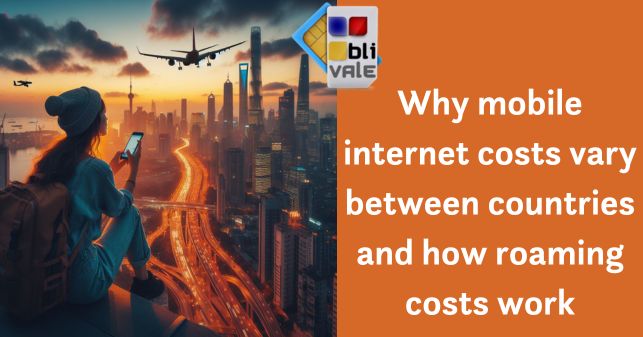Today, mobile internet has become essential for most of us. It allows us to stay connected wherever we are, access information and services at any time and stay in touch with friends and family even when we travel. However, many people often find themselves confused and frustrated by the variable costs of mobile internet, especially when traveling abroad and having to pay roaming charges.
In this article, we will try to explain simply and clearly why mobile internet costs vary so much between different countries and how exactly roaming costs work. You will also discover some useful tips to better manage your internet connection when traveling abroad and to avoid unexpected additional costs.
Why do mobile internet costs vary between countries?
The main reason why mobile internet connection costs differ significantly from one country to another is to be found in the different infrastructure and regulatory standards present in each nation.
Differences in network infrastructures
Each country has developed its own mobile telecommunications network over the years, with different investments, technologies and territorial coverage. Some countries have more advanced and widespread networks, with 5G coverage and high connection speeds, while others are still behind in terms of infrastructure.
Obviously, maintaining and managing more modern and high-performance mobile networks entails higher costs for telephone operators, which are then partly passed on to the final prices for consumers.
Furthermore, the costs of building and maintaining network infrastructure vary greatly by country, influenced by factors such as:
-
Costs of labor and building materials
-
Orography and geographical conformation of the territory
-
Population density and distribution
For example, building and maintaining a high-performance mobile network in a mountainous and sparsely populated country like Switzerland involves much higher costs than in a flat and densely populated country like the Netherlands.
Differences in market regulation
Another key factor that affects mobile internet prices is the regulation of the telecommunications market in each country.
Some governments impose strict regulations and limits on operator prices and fees to ensure affordable prices and fair competition. Other countries, however, have a more liberal approach, leaving operators greater freedom to determine prices independently.
Furthermore, in some cases national governments offer incentives or subsidies to operators to encourage investments in networks and promote access to connectivity for all citizens, regardless of their income or geographical location.
All this translates into very marked differences in final prices for consumers, given the same services and network performance.
Differences in supply and demand
A final factor that influences the costs of mobile internet connection is the supply and demand of telecommunications services in each country.
In some markets the demand for mobile connectivity is very high and users are willing to pay higher prices for quality services. In other countries, however, demand is more limited, perhaps because the average income of the population is lower, and operators are forced to maintain more accessible prices.
Likewise, in some markets there is increased competition between operators, who struggle to gain market share through more convenient offers. In other contexts, however, the market is dominated by one or a few large players, who can impose higher prices without fear of losing customers.
All these factors combine to determine very marked differences in the costs of mobile internet connection between the various countries of the world.
How roaming charges work
In addition to price differences between various countries, another source of confusion and frustration for many users are roaming costs, i.e. the additional costs you incur when using your smartphone abroad.
What is roaming?
Roaming occurs when a mobile user connects to a telecommunications network in a country other than the one in which their telephone contract is registered.
When you are abroad, your smartphone cannot connect directly to your home operator's network, but must temporarily rely on the network of a local operator in the country you are in. This additional service involves extra costs that are charged to the user.
How are roaming costs calculated?
Roaming costs are usually calculated based on several factors:
-
Type of service used (calls, SMS, data connection)
-
Duration of service (call minutes, MB of data traffic)
-
Country you are in (costs vary greatly from country to country)
For example, when roaming in Europe, the costs for 1 MB of data traffic can range from a few cents up to 60-70 cents, depending on the country. For outgoing calls the cost can be 20-30 cents per minute.
Furthermore, telephone operators often apply additional costs for activating and deactivating the roaming service, in addition to any monthly fees.
How to avoid roaming charges?
To avoid unexpected and uncontrolled expenses due to roaming, here are some useful tips:
-
Find out in advance about your operator's roaming costs and the countries included in the flat rates
-
Activate roaming packages or additional options that allow you to use your tariff plan even abroad at low costs. BLIVALE offers clear and transparent tariff plans for the use of mobile internet connection abroad.
-
Use Wi-Fi whenever possible, thus avoiding consuming data traffic while roaming. However, it is necessary to be alert with free hotspot connections (such as in hotels, airports, restaurants, free airlines, etc.) because we can download viruses and other things without our knowledge, and access is always requested (often free) by signing up. Furthermore, connections often drop and cannot be used for a long time and are very slow.
-
Deactivate data roaming and only use calls and SMS if you do not have active roaming data packages
To maintain unique costs when changing countries and avoid roaming costs, purchase the SIM Card and eSIM from BLIVALE , we offer clear and transparent tariff plans for the use of mobile internet connection abroad.
By following these precautions, you can avoid unpleasant surprises related to roaming costs and maintain control of your mobile internet spending even when traveling abroad.
Conclusions
In summary, the costs of mobile internet connection vary considerably between different countries due to a series of factors related to network infrastructure, market regulation and the supply/demand of telecommunications services.
In addition to these price differences, another source of confusion and frustration for users are the additional roaming costs, i.e. the costs that you incur when using your smartphone abroad, temporarily connecting to local operator networks.
To better manage your mobile internet connection when traveling abroad and avoid unexpected costs, it is important to find out in advance about roaming costs, activate packages or additional options and, when possible, prefer Wi-Fi to roaming data connections.
To maintain unique costs when changing countries and avoid roaming costs, purchase the SIM Card and eSIM from BLIVALE , we offer clear and transparent tariff plans for the use of mobile internet connection abroad.
By following these simple precautions, you will be able to fully enjoy the advantages of mobile connectivity even when you are away from home, without having to deal with nasty surprises on your bill.









